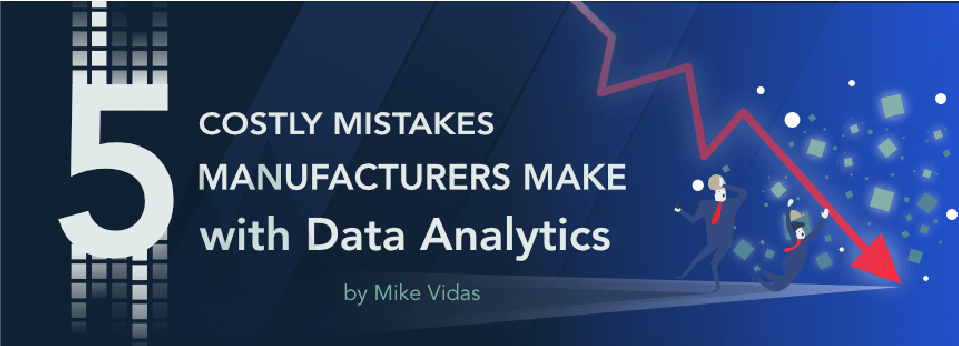

Successful manufacturers strategically access data in order to obtain a clear picture of their entire business and make informed, strategic decisions. Every manufacturer should be following this best practice, yet many are inexplicably making avoidable mistakes regarding data analytics that negatively impact their business.
The five most common big data analytics mistakes manufacturers are making are:
1) Thinking big data is too expensive and complicated
The growth of the Internet, wireless networks, smartphones, sensors, and other digital technology has made big data, which used to be the exclusive domain of statisticians and large corporations, far more accessible according to Intuit’s The New Data Democracy: How Big Data Will Revolutionize the Lives of Small Businesses and Consumers report.
This big data revolution means manufacturers of all sizes now have access to cost-effective bottom-line improving solutions to mine data. Leveraging these solutions results in numerous benefits including more effective marketing operations, better customer relationships, reduced waste and variability in production processes and increased product quality and yield according to McKinsey and Company.
2) Failure to set business objectives prior to investing in data analytics
While 75% of companies feel they are making the most of their data, 43% believe they “obtain little tangible benefit from their information” and 23% feel they “derive no benefit whatsoever” according to a report from Pricewaterhouse Coopers (PwC) and Iron Mountain. The primary reason for this disparity is that some companies don’t determine the objectives they want to achieve prior to investing in data analytics technology. If their data analytics technology doesn’t help to achieve business objectives, then desired outcomes will not result.
3) Starting too big
Too many manufacturers getting started with data analytics get bogged down with the sheer amount of information available, which consequently slows their ability to make informed business decisions. Starting small with data analytics enables your team to understand what is needed from your manufacturing companies data in order to achieve specific business outcomes. This knowledge helps guide strategic investment in data analytics rather than investing in a costly framework that may offer capabilities your manufacturing company has no need for. In Thinking with Data, Max Shron offers guidelines to help narrow the scope of a data analytics project.
4) Failing to prioritize data analytics projects properly
Whether you have a data science team, one or two data analysts or someone who analyzes data in addition to fulfilling another job role, it’s likely they are struggling to juggle many competing and overlapping priorities when it comes to analyzing your manufacturing company’s data. Every department manager who interacts with them probably feels his or her project should be top priority. To get the most business value from your data, it’s important to ensure that there is a methodology in place that empowers whoever is performing data analytics for your organization to focus on critical projects, those that will have the most impact on your business.
5) Not engaging in Process Mining
Process Mining entails applying specialized data mining algorithms to event log data and other similar data sources within your manufacturing organization or supply chain. It makes identifying trends, patterns and details possible, which helps improve process efficiency and provides a better understanding of processes. Benefits of Process Mining include lower inventory costs, problem identification (i.e. bottlenecks), improved on-time delivery, optimized logistics between production sites, distribution centers and end clients, and less lost inventory as the result of process mistakes or failures.
Another plus side of Process Mining is that the technology needed to engage in it is compatible with a variety of legacy systems. You can therefore be on the path to operational transparency and securing a better understanding of your existing manufacturing operations in a relatively short period of time.
Your data is an asset and, just like any asset, it needs to work for you. Timely data analytics will drive profitability by improving day-to-day operations while future-proofing your manufacturing company. Leveraging your business intelligence and analytics functions to become a data-centric company may seem like a daunting task, but the right technology partner will devise a plan for you that meets your specific needs. The end result is that you’ll have a real-time view of your business processes so you can make the right decisions—right now.
If you’re ready to use your data intelligently to do business better, Hitachi Solutions has a long, proven history of helping manufacturers expose key data and use advanced analytics to support better decision-making while maintaining business agility.


